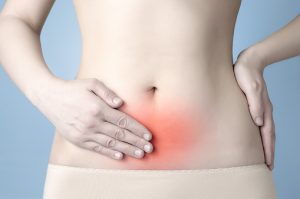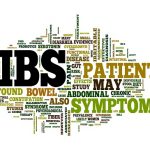 Irritable bowel syndrome (IBS) and endometriosis both result in abdominal pain, and it’s been found that women with endometriosis are at a higher risk of developing irritable bowel syndrome.
Irritable bowel syndrome (IBS) and endometriosis both result in abdominal pain, and it’s been found that women with endometriosis are at a higher risk of developing irritable bowel syndrome.
IBS is a functional disorder. Which means, it is not a disease per se, so the symptoms don’t have an identifiable cause. IBS patients show no clinical signs of a disease and often have normal test results. IBS is sometimes referred to as spastic colitis or mucous colitis, but that’s an erroneous nomenclature, as itis signifies inflammation and IBS does not cause inflammation. Although IBS is not such a critical condition, it can still severely affect one’s quality of life, as it can cause a great deal of discomfort and distress. The symptoms of IBS, ranging from mildly annoying to disabling, can interfere with a person’s social life, ability to work or travel, and also affect their self-image.
Advertisement
Endometriosis is a painful condition that affects an estimated one in 10 women during their reproductive years. Statistical studies show this works out to about 176 million women around the world between the ages of 15 and 49.
Endometriosis, which is pronounced en-doe-me-tree-O-sis, essentially means that a tissue (the endometrium), which lines the inside of a woman’s uterus, grows outside the uterus. Endometriosis can involve the ovaries, bowel, or the tissue lining the pelvis. It can also spread beyond the pelvic area, but it is rare.
When a woman has endometriosis, tissue acts like it is supposed to, except that it is thick, breaks down, and bleeds with each menstrual cycle. Since the tissue is displaced, it has no way to exit the body. This means that surrounding tissue can become irritated, eventually leading to scar formation and adhesions, something that can bind organs together. When endometriosis involves the ovaries, cysts can form.
Link between endometriosis and IBS
As mentioned, women with endometriosis have a higher likelihood of being diagnosed with IBS. The risk exists prior to and after endometriosis diagnosis, suggesting that IBS is not a misdiagnosis of endometriosis.
The link between endometriosis and IBS stems from the endometrial tissue reaching the large intestine. When this tissue becomes inflamed, it can contribute to bowel problems.
You may have greater success in narrowing down on an endometriosis diagnosis if your symptoms worsen during your menstrual cycle.
IBS vs. endometriosis: U.S. prevalence
 Even though not all individuals with IBS symptoms seek medical care, there are between 2.4 and 3.5 million annual GP visits for IBS in the United States alone. But the severity of symptoms varies. Among patients with IBS, 25 percent have severe IBS, 35 percent moderate IBS, and about 40 percent of people have mild IBS.
Even though not all individuals with IBS symptoms seek medical care, there are between 2.4 and 3.5 million annual GP visits for IBS in the United States alone. But the severity of symptoms varies. Among patients with IBS, 25 percent have severe IBS, 35 percent moderate IBS, and about 40 percent of people have mild IBS.
An estimated 10 percent of women will develop endometriosis during their reproductive years. Currently, over 10 million women have endometriosis in the U.S. Prevalence of endometriosis among infertile women is 25 to 35 percent. On average, it can take up to 9.2 years to properly diagnose endometriosis.
Signs and symptoms of IBD vs. endometriosis
Researchers conclude that the muscles in the colon of an IBS patient contract more readily than in normal people, leading to the various symptoms including:
- Diarrhea, constipation, or alternating between the two
- Abdominal pains or cramps (usually in the lower half of the abdomen)
- Harder or looser bowel movements than average
- Excess gas
How can someone tell if they have endometriosis? There are several endometriosis symptoms, but pelvic pain is the most common. Other symptoms could include painful periods, pain following sexual intercourse, discomfort with bowel movements, heavy bleeding during menstrual period or between periods, lower back pain, and, of course, inability to get pregnant.
Difference between irritable bowel syndrome and endometriosis causes
 There is still a lot of debate over the real cause of IBS. While stress is no doubt an important aspect, researchers now believe that the main cause of IBS is a disturbance in the way the brain and the gut interact.
There is still a lot of debate over the real cause of IBS. While stress is no doubt an important aspect, researchers now believe that the main cause of IBS is a disturbance in the way the brain and the gut interact.
Researchers observed that people with IBS exhibit irregular patterns of colon motility due to an unusual sensitivity in the nerve endings in the bowel. Hence, the term “irritable.” Because of this heightened sensitiveness, ordinary stimuli — eating, stress, hormonal changes, gaseous distension, and certain medicines or foods — can trigger an exaggerated response in people with IBS, causing irregular colon motility.
Endometriosis was first described by doctors around the turn of the 19th century. Since then, much has been studied about the condition. We know that during a normal menstrual cycle, a woman sheds the lining of her uterus. The blood flows from her uterus through a small opening in the cervix. However, with endometriosis, menstrual blood flows back into the pelvic cavity through the fallopian tubes instead of leaving the body.
There could be reasons for this that we are not aware of. Some specialists believe, it is possible for the menstrual blood to leak into the pelvic cavity through a surgical scar, such as a caesarean section scar. There is also the belief that one of the causes of endometriosis could simply be that small areas of the abdomen convert into endometrial tissue. This may happen because cells in the abdomen grow from embryonic cells, which can change shape and act like endometrial cells.
There are four stages or types of endometriosis. Stage one, which is also referred to as minimal, involves small lesions or wounds, and shallow tissue implants on the ovaries. Stage two, called mild, involves light lesions and shallow implants on an ovary and pelvic lining. Stage three is considered moderate and includes deep implants, while stage four, which is severe, involves deep implants, as well as the possibility of lesions on the fallopian tubes and bowels.
Endometriosis generally takes place many years after a woman has begun menstruating. There is a set of risk factors involved. Understanding the risks can help you determine whether you should be speaking with your doctor about the condition.
IBS vs. endometriosis risk factors and complications
You are more likely to have IBS if you are:
- IBS tends to occur in people under age 45.
- Overall, about twice as many women as men have the condition.
- Related to an IBS patient.Studies suggest that people who have a family member with IBS may be at increased risk of the condition.
- Suffering a mental health problem.Anxiety, depression, a personality disorder, and a history of childhood sexual abuse are risk factors. For women, domestic abuse may be a risk factor as well.
Complications of IBS include diarrhea or constipation, aggravating hemorrhoids, and intolerance to certain foods. IBS may cause you to have a reduced quality of life as you must be mindful of what you eat, which could lead to depression. Make sure to take care of your mental health if you’re living with IBS, as mental problems could worsen your condition.
Some endometriosis risk factors may include…
- Family history – if you have a family member who has had it
- Pregnancy history – women who haven’t had children have a higher risk
- Menstrual history – women with short, heavier, or longer than normal cycles may be at higher risk
Complications related to endometriosis include infertility and ovarian cancer.
Diagnosing IBS and endometriosis pain
 Because there are usually no physical signs to definitively diagnose IBS, the clinicians often resort to eliminating other conditions to arrive at a diagnosis.
Because there are usually no physical signs to definitively diagnose IBS, the clinicians often resort to eliminating other conditions to arrive at a diagnosis.
If you fit the IBS criteria, your doctor may suggest a course of treatment without doing additional testing. But if you don’t respond to that treatment, you’ll likely require more tests like:
Imaging tests:
- Flexible sigmoidoscopy
- Colonoscopy
- X-ray (radiography)
- Computerized tomography (CT) scans
- Lower GI series
Laboratory tests:
- Lactose intolerance tests
- Breath tests
- Blood tests
- Stool tests
If you are experiencing any unusual symptoms, it is important to see a doctor to determine what the problem is. If your symptoms match some of those associated with endometriosis, the doctor will likely conduct a pelvic exam. This is just a manual test to feel areas of the pelvis for abnormalities.
Ultrasound tests are often used by doctors in the diagnosis of endometriosis. While an ultrasound can’t detect endometriosis, it can determine whether or not a woman has a cyst that might be associated with endometriosis.
A test known as a laparoscopy is commonly used to be certain that a person has endometriosis. A tiny incision is made near the navel and a slender viewing instrument called a laparoscope is inserted so the doctor can look for endometrial tissue outside the uterus.
Treatment for irritable bowel syndrome and endometriosis
Because it’s not clear what causes irritable bowel syndrome, treatment focuses on the relief of symptoms so that you can live as normally as possible.
In most cases, you can successfully control mild signs and symptoms of irritable bowel syndrome by learning to manage stress and making changes in your diet and lifestyle.
Dietary changes:
- Eliminating high-gas foods
- Eliminating gluten
- Eliminating FODMAPs (fermentable oligo-, di-, and monosaccharides, and polyols)
Medications:
- Fiber supplements
- Antidiarrheal medications
- Anticholinergic and antispasmodic medications
- Antidepressant medications
- Antibiotics
Endometriosis treatment can either be medication or surgery. It all depends on the severity of a person’s condition. It will also depend on whether or not the woman is planning on becoming pregnant.
Here are a few possible options a doctor might suggest for treating endometriosis:
- Over-the-counter pain medication, such as Advil, Motrin IB, Aleve
- Hormone therapy, which can be effective in relieving pain
- Contraceptives to reduce pain
- GnRh agonists and antagonists, which are hormone stimulators that prevent menstruation and cause endometrial tissue to shrink
- Depo-Provera, an injectable drug that stops menstruation and growth of endometrial implants
- Danazol, which suppresses growth of endometrium and prevents menstruation
While they can be effective, it is important to understand that many of these medications have side effects that people should take into careful consideration.
Advertisement
There are also conservative forms of surgery to remove the endometriosis and still allow for pregnancy. Doctors will often suggest an endometriosis treatment that does not involve surgery, along with an assisted reproductive technology for those who want to have children. In cases that are severe and where having children is not an issue, a hysterectomy may be suggested.
Research into both endometriosis causes and treatments continues, but some recent studies seem to suggest that chronic exposure to environmental chemicals is linked to an increased risk of endometriosis. One way to reduce risk is to consider avoiding chemicals and focusing on natural treatment options for endometriosis.
For many women, endometriosis is a disease that has been surrounded by taboos, lack of awareness, and often delayed diagnosis and treatment. The problem is overshadowed by the fact that some of the symptoms can mirror other conditions. It’s important that if you have any of the symptoms outlined here, you seek answers – don’t give up until you are satisfied that you have received a proper diagnosis and are set on a path to recovery. Endometriosis can be painful and frustrating, but it doesn’t have to ruin your life.
